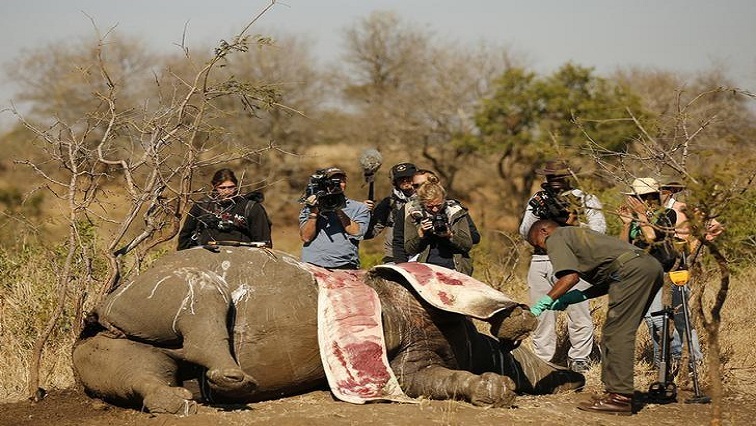Members of the media film as a ranger performs a post mortem on the carcass of a rhino after it was killed for its horn by poachers at the Kruger national park in Mpumalanga province August 27, 2014.
The Environmental Affairs Department says 24 rhinos have been killed in South Africa in the past two weeks.
It says seven carcasses were found at Kruger National Park, another seven in Mpumalanga, six in KwaZulu-Natal and four in the Western Cape.
The department has condemned the poaching of rhino for their horn, saying nine suspected poachers have been arrested in the first 14 days of December.
It has encouraged the public to assist with information that could lead to the arrest and prosecution of poachers.
South Africa is home to nearly 80% of Africa’s rhino population which stands at less than 30 000.
Stricter sentences for rhino poachers
Some anti-poaching organisations are calling upon the justice system to strengthen punishment against those found guilty of rhino poaching and rhino horn trafficking.
Nature conservationists say the rhino is among the endangered species, not only in South Africa and the African continent but across the world.
According to the Helping Rhinos organisation, there are now less than 30 000 rhinos living in the wild today, compared to the start of the 20th century, where there were over 500 000 of them.
According to another study released by Save the Rhino International organisation in February this year, a rhino was poached every 22 hours in South Africa in 2020.
Founder of the Protrack anti-poaching organisation, Vincent Barkas, says the South African justice system needs to impose harsher punishment on those guilty of rhino poaching and rhino horn trading.
“The poachers get caught and the next morning they are out on bail. That same guy will come tomorrow again. Our laws must treat it as a more serious crime than just poaching because tomorrow there will be no more rhinos. It’s a very very difficult situation that I suspect all the wildlife guys are sitting with, not only in South Africa. It’s the whole of Africa that we have to think of about that problem,” says Barkas.
SABC News
